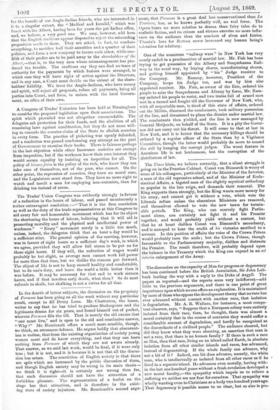In the dearth of better subjects, the discussion on the
propriety of Formosa has been going on all the week without any particular result, except to fill Drury Lane. Mr. Chatterton, the lessee, writes to say that he has tried to produce Shakespeare and the legitimate drama for six years, and found himself out of pocket, whereas Formosa fills the till. That is merely the old excuse that "one must live," and is open to the old and conclusive answer, "Why ?" Mr. Boucicault offers a much more sensible, though, we think, an erroneous defence. He argues boldly that obscurant- ism is useless, that from the existing organization of society young women must and do know everything, and that they can learn nothing from Formosa of which they are not aware already. That answer, as we said last week, would be final, if it were only true ; but it is not, and it is because it is not that all the discus- sion has arisen. The conviction of English society is that there are eyils which are increased by the public discussion of them, and though English society may be wrong in its main thesis— we think it is right--it is certainly not wrong thus far, that such discussion should not have the attraction of a forbidden pleasure. The representation of a harlot on the stage has that attraction, and is therefore in the exist- ing state of society injurious. Mr. Boucicault's second argu- ment, that Formosa is a great deal less unconventional than La Trariata, has, as he knows perfectly well, no real force. The Opera bears no more relation to drama than fairy tales do to realistic fiction, and its crimes and virtues etereise no more influ- ence on the audience than the conduct of elves and fairies. Titania's love for Bottom never increased any human being's toleration for adultery.






























 Previous page
Previous page